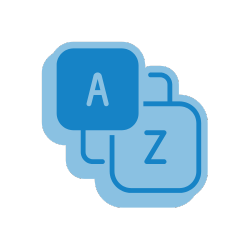AI and data services for natural language processing
Whether it’s improving a Deep Learning Model’s capability to understand language nuances or post-processing AI generated output for multilingual campaigns, our language experts can help you at every step of the way.
- Solutions for AI developers
- Solutions for content creators using AI
We’re the human in the loop
Building a high-performing AI solution requires plenty of development time, but also lots of testing. While some part of this process can be carried out by QA engineers, in the case of language processing models, the output needs to be checked and evaluated by professional human linguists. Whether it’s spoken or written language, our team helps provide structured feedback to optimise your algorithm so that it sounds and feels as human as possible.
Our services for AI Developers

Data tagging
We can help you tag data to make it easier for your AI model to learn from it. We maintain strict adherence to annotation guidelines, ensuring consistent tagging across all your data sets.

Structured feedback
Feedback plays a vital role in refining AI language models. From grammar to relevance and from fluidity to tone, our team of language experts conducts thorough evaluations of AI language output to assess the overall quality of the generated text.

Voice recording to train AI-powered devices
We can provide high-quality voice recordings to train your AI-powered devices. Our team can work with you to create a custom script, ensuring that the recordings are suitable for your specific needs.
The nuances of natural language
Human language is unique among all forms of communication. Every conversation or written text has a myriad of subtle details and intricacies that convey meaning beyond the surface level. While it has been demonstrated that some AI models are smart enough to understand jokes, there are certain aspects of culture and humour that still remain intrinsically human.
Did you know that AI still can’t make full sense of memes? While it can recognise text and facial expressions, memes relying so heavily on our own life experience, cultural references, subtext and shared knowledge make it a challenging task for AI.
Perhaps the most important thing is that human language isn’t a fixed thing. On the contrary, it is an ever-evolving phenomenon as it changes and adapts over time, reflecting the evolution of societies, cultures, and communication patterns.
As new linguistic patterns, vocabulary and expressions emerge, AI models trained on older data become less effective. Retraining AI models with updated and relevant data helps them adapt to these changes and maintain their performance over time.
Humans & machines working together
More and more companies are leveraging artificial intelligence, especially when it comes to content production. Using tools like ChatGPT allows teams to produce high-quality content while saving time and resources. However, whether it is blog posts, social media captions, email newsletters, product descriptions or images that you generate with this type of tool, they still require human checking and editing to ensure accuracy, brand consistency, and adherence to ethical guidelines.
Our services for Content Creators using AI

Fact checking
Fact-checking services play a crucial role in evaluating the accuracy and credibility of AI-generated content. As AI models like ChatGPT generate text based on patterns and data, it’s important to verify the information they provide.

Terminology adherence
We validate the usage of industry-specific terminology, cross-referencing content with authoritative sources, or utilising glossaries and style guides specific to your organisation.

Proofread/post-edit AI-generated content
We can proofread and edit AI-generated content, ensuring that there are no grammatical or semantical errors. We can also normalise date formats and rewrite for a different degree of formality.

Tone of voice
We modify sentence structure or incorporate specific phrases to refine AI-generated content and ensure that the style matches your brand’s tone of voice and identity.

Image curation
Our team can perform a cultural analysis of images generated with AI engines. This service is ideal for companies looking to create personalised visual content at scale.
Let’s talk about your next project
We help you to navigate the nuances of human communication effortlessly.